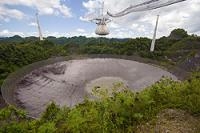SRI International Selected by the National Science Foundation to Manage Arecibo Observatory
Submitted on 12 July 2011 - 9:18pm
This article is reproduced by CienciaPR with permission from the original source.

Press release, SRI International
MENLO PARK, Calif.—June 2, 2011—SRI International, leading a multi-organization team, has been awarded a five-year cooperative agreement by the National Science Foundation (NSF) to manage, operate and maintain the Arecibo Observatory in Puerto Rico. The observatory, preeminent for its research in astronomy, planetary studies, and space and atmospheric sciences, is the world's largest and most sensitive single-dish radio telescope. The award, valued at approximately $42M, is scheduled to begin October 1, 2011, following a four-month transition period.
"SRI and its partners bring extensive experience in facility management, space science, radio astronomy and a wide range of high-power radar techniques, as well as expertise in university partnerships and community relations. Together, we will support and, more importantly, expand the observatory's cutting-edge science programs," said John Kelly, Ph.D., senior director of the Center for GeoSpace Studies at SRI. "We will use our combined expertise to allow the observatory to become an ever greater resource to the astronomy, planetary science, and space science communities."
SRI and its on-site partners—the Universities Space Research Association (USRA), the Universidad Metropolitana (UMET) in San Juan, Puerto Rico, and the University of Puerto Rico (UPR)—will work together under the leadership of Robert Kerr, Ph.D., SRI's director designate of the Arecibo Observatory, to forge a new future for the observatory.
SRI and the USRA will leverage their science operations and management experience to enhance and develop observatory capabilities in Radio Astronomy, Planetary Radar Science (PRS), and Space and Atmospheric Science (SAS). UMET, part of Puerto Rico's second largest private university system, brings expertise in education, public outreach and facilities management, and will cover site operations and education and public outreach activities at the observatory. UPR will sponsor joint faculty appointments and will develop education and research opportunities.
To advance research and education at the observatory, SRI and its partners are working with multiple Puerto Rican government agencies and private organizations to ensure close collaboration with educational and economic development institutions in Puerto Rico.
"This development is a turning point in the future of the observatory where we will create and expand Puerto Rican and international educational opportunities in ways that were never before possible," said UMET's Vice President for Planning and Academic Affairs, Dr. Juan Arratia.
"This is an excellent collaborative effort and will represent expanded opportunities for research and graduate studies in astronomy and atmospheric sciences at UPR," said UPR President, Dr. Miguel Muñoz.
"We are committed to our role in managing the astronomy and planetary studies programs, and to the entire team effort of building a great future for the observatory, in both research and education," said USRA President, Dr. Fred Tarantino.
"I look forward to a new, bright and expanding future building on past scientific successes and the skill, expertise and dedication of the observatory staff," said SRI's Director Designate of the Arecibo Observatory, Dr. Robert Kerr. "Our vision and broad reach-back to Puerto Rican, mainland and international university communities will bring forward new ideas and new science, assuring the observatory's leading position for many years into the future."
SRI's GeoSpace Studies Projects for the NSF
SRI's Center for GeoSpace Studies (CGS) specializes in the study of the fundamental processes governing the nature of the upper atmosphere and space environment. These studies involve experiments using incoherent scatter radar, satellite and optical instruments, radiowave diagnostics, and basic physics research in ionospheric and magnetospheric physics, middle atmosphere and lower thermosphere, and stratosphere and troposphere. Currently, the CGS operates, manages, and conducts research at the Sondrestrom Research Facility in Greenland, at Poker Flat in Alaska, and at Resolute Bay in northern Canada, through various NSF co-operative agreements. CGS is constructing additional high-power radars at Resolute Bay, in Argentina, and in other locations.
For more information, visit http://www.sri.com/esd/cgs/.
About SRI International
Silicon Valley-based SRI International, a nonprofit research and development organization, performs sponsored R&D for governments, businesses, and foundations. SRI brings its innovations to the marketplace through technology licensing, new products, and spin-off ventures. Commemorating its 65th anniversary in 2011, SRI is known for world-changing innovations in computing, health and pharmaceuticals, chemistry and materials, sensing, energy, education, national defense, and more.







